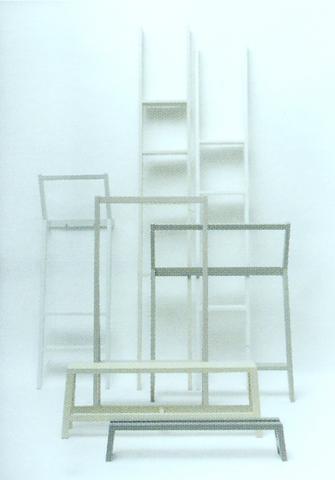Amorphous chairs, outrageously colored lamps and many other contemporary designs have gradually moved into "hip" households in Taiwan. As Germany and Scandinavian countries are still most often associated with contemporary design in people's minds here, the current exhibition at Taipei Fine Arts Museum (
Domains -- Contemporary Israeli Design (領域: 當代以色列設計展) is a traveling exhibition aimed at audience in East Asia and the Pacific region. To present a rounded sampling of contemporary Israeli design, well-known designers are exhibiting, such as Yaacov Kaufman -- who works for Lumina Italia -- as well as rising talents such as Ron Gilad, whose bullet-shot vase caught much attention at the opening of the show. Most of the 10 designers have gained increasing international recognition for their innovative works with a unique identity.

PHOTO COURTESY OF TFAM
Nirith Nelson, curator of Domains, explains at the opening of the exhibition that the short history of the state of Israel encourages designers to try out innovative concepts while the diversity of ethnic groups contributes to the variety of design approaches. The unstable political situation and limited economy in Israel, Nelson said, has turned designers' attention to improvisation and quick-fixes instead of time-consuming complex devices.
These improvisations are usually very amusing and original. Some of them have a pristine kind of beauty.
Yaacov Kaufman had in mind humanity's first chair when he designed Potchim. This one-off piece uses a complete block of tree trunk, part of which is still covered with bark. By making only two cuts and fixing a pair of hinges on the trunk, it becomes a folding chair. A similar trunk is cut only once, in a long "s" curve, to become a pair of chairs which easily blend in with a forest.
A recent graduate from Israel's well-known Bezalel Academy of Art and Design, Sharon Peter Shechter incorporates the element of time in his furniture design in a humourous way. In Lamp Table, a table with book ends, Shechter cuts the veneer of formica from the wood table surface and bends the protruding formica to form the stem of a lamp and book ends. In Israeli households, there are countless tables which share this peeling-veneer appearance, only there it was caused by wear.
Probably the most beautiful work in the exhibition is Ami Drach and Dov Ganchrow's Ga-mish, which looks nothing like a household object. The framed flexible plywood strips forms a vertical fretwork.
Placed against a wall, it can be a shelf of flexible compartments. Standing alone, it can be a room partition, or a floor window suitable for a Mediterranean climate. Whatever it is, the structure is a pleasure to look at. Pleasure, according to the curator Nelson, is one of the main triggers of Israel design today.
Domains -- Contemporary Israeli Design will run through Feb. 15 at Taipei Fine Arts Museum, 181, Zhongshan N Rd, Sec 3, Taipei. (

In the March 9 edition of the Taipei Times a piece by Ninon Godefroy ran with the headine “The quiet, gentle rhythm of Taiwan.” It started with the line “Taiwan is a small, humble place. There is no Eiffel Tower, no pyramids — no singular attraction that draws the world’s attention.” I laughed out loud at that. This was out of no disrespect for the author or the piece, which made some interesting analogies and good points about how both Din Tai Fung’s and Taiwan Semiconductor Manufacturing Co’s (TSMC, 台積電) meticulous attention to detail and quality are not quite up to

April 21 to April 27 Hsieh Er’s (謝娥) political fortunes were rising fast after she got out of jail and joined the Chinese Nationalist Party (KMT) in December 1945. Not only did she hold key positions in various committees, she was elected the only woman on the Taipei City Council and headed to Nanjing in 1946 as the sole Taiwanese female representative to the National Constituent Assembly. With the support of first lady Soong May-ling (宋美齡), she started the Taipei Women’s Association and Taiwan Provincial Women’s Association, where she

Chinese Nationalist Party (KMT) Chairman Eric Chu (朱立倫) hatched a bold plan to charge forward and seize the initiative when he held a protest in front of the Taipei City Prosecutors’ Office. Though risky, because illegal, its success would help tackle at least six problems facing both himself and the KMT. What he did not see coming was Taipei Mayor Chiang Wan-an (將萬安) tripping him up out of the gate. In spite of Chu being the most consequential and successful KMT chairman since the early 2010s — arguably saving the party from financial ruin and restoring its electoral viability —

It is one of the more remarkable facts of Taiwan history that it was never occupied or claimed by any of the numerous kingdoms of southern China — Han or otherwise — that lay just across the water from it. None of their brilliant ministers ever discovered that Taiwan was a “core interest” of the state whose annexation was “inevitable.” As Paul Kua notes in an excellent monograph laying out how the Portuguese gave Taiwan the name “Formosa,” the first Europeans to express an interest in occupying Taiwan were the Spanish. Tonio Andrade in his seminal work, How Taiwan Became Chinese,